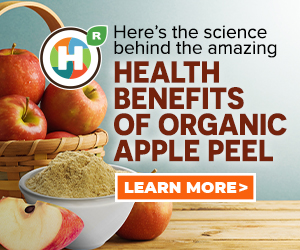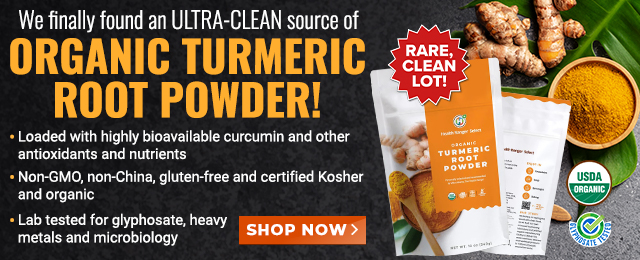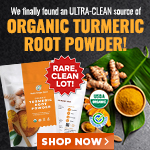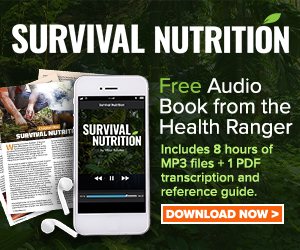
Five reasons why it pays to buy organic
Tuesday, March 22, 2011 by: Dianna Dill
Tags: organic, foods, health news
- Pfizer's RSV vaccine linked to preterm births as drug giant CONCEALED RISKS from pregnant women in unethical clinical trials
- Shedding light on the dark side of MMR vaccines: How vaccinated individuals SPREAD MEASLES & put the vulnerable at risk
- Dane Wigington exposes climate engineering as ‘All-Out Weather and Biological Warfare’
- Sen. Johnson demands COVID vaccine makers hand over all documents, communications, as evidence against their products reaches a climax
- Photonic revolution: New chips process data using light instead of electricity
- Criminal referral requests filed against Fauci and top COVID officials in seven states
- EU pauses retaliatory tariffs as Trump temporarily halts new duties
- Israeli lobbyists boast of controlling US national security policy in leaked AIPAC audio
- The humble Potato: Nutritional benefits and how to enjoy it the healthy way
- Tulsi Gabbard leads charge against the Biden regime’s global censorship of the 'Disinformation Dozen'
- Analysis: The coming economic collapse, a mass uprising and Trump's three secret weapons to halt the growing revolt
- Aerosolized bioweapons? Strange “diploid biomasses” falling out of the sky in Florida captured under the microscope
- Fauci is back in the limelight, and he’s busy promoting a future COVID or FLU pandemic
- Aluminum, essential to vaccine science, also causes serious health conditions, including chronic fatigue, neurodegenerative diseases, macrophagic myofasciitis
- DOGE unveils $400M unemployment fraud scandal: Toddlers, futuristic birthdates fuel outcry
- U.S. lawmakers investigate Meta over alleged China collaboration
- Synthetic milk from Bored Cow and Perfect Day contains 92 unidentified molecules, including fungicides
- Chemtrails unveiled: How the CIA and Big Business are manipulating the weather for profit
- Aerosolized bioweapons? Strange “diploid biomasses” falling out of the sky in Florida captured under the microscope
- Widespread social and economic unrest: Steve Quayle issues urgent financial warning of imminent asset collapse in new interview with Mike Adams
- Tulsi Gabbard leads charge against the Biden regime’s global censorship of the 'Disinformation Dozen'
- Fauci is back in the limelight, and he’s busy promoting a future COVID or FLU pandemic
- Analysis: The coming economic collapse, a mass uprising and Trump's three secret weapons to halt the growing revolt
- Kiss Your Genetic Privacy Good-Bye! 23andMe Gets Green Light to Sell Your Intimate Genetic Details to Anyone They Want
- CLOT SHOT PLANDEMIC UNFOLDING: Fibrous, rubbery clots caused by covid injections have prion-like seeding activity
- Mike Adams releases country western hit single: Goin’ Back in Time is Comin’ Home
- DEATH by VACCINE or face PRISON time: Canadian Freedom Convoy leaders CONVICTED for protesting forced vaccination during the Covid Plandemic
- Tulsi Gabbard takes aim at censorship: Justice for the ‘Disinformation Dozen’
- How Israeli military-connected corporations are secretly controlling your online privacy
- European Court of Justice: Healthcare professionals who promoted or administered COVID-19 vaccines are CRIMINALLY LIABLE for any harm caused
- Defunding DEADLY mRNA jabs: Government funding for mRNA technology being scrutinized and sidelined until proven "safe and effective" for real
- U.S. lawmakers investigate Meta over alleged China collaboration
- Federal employees whine over DOGE's new directive requiring them to do a 5-point summary of weekly accomplishments
- U.S. approves new Russian ambassador as diplomatic thaw continues
- Trump administration poised to overhaul crypto regulations with new SEC leadership
- I Want My Bailout Money – new song and music video released by Mike Adams
- Newly released JFK files reveal Pentagon's role in creating Lyme disease and covid in the same lab
- Analysis: The coming economic collapse, a mass uprising and Trump's three secret weapons to halt the growing revolt
- Mike Adams releases country western hit single: Goin’ Back in Time is Comin’ Home
- MEDICAL BOMBSHELL: FDA admits Covid mRNA 'Vaccines' CAUSE CANCER
- Aerosolized bioweapons? Strange “diploid biomasses” falling out of the sky in Florida captured under the microscope
- Trump reverses course on Gaza plan, says “nobody is expelling Palestinians”
- Dr. Mike Yeadon releases 15-minute testimony - WATCH - about genocidal intent of COVID “vaccines”
- Kiss Your Genetic Privacy Good-Bye! 23andMe Gets Green Light to Sell Your Intimate Genetic Details to Anyone They Want
- 5 Simple steps to boost your brainpower: How to strengthen executive function in a distracted world
- A lack of integrity in Academia: Harvard professor found GUILTY of fraudulent research to promote CRT theory
- The Health Ranger releases “Vaccine Zombie” song and music video, using AI-animated zombies for the music video
- California's social media censorship law struck down: A victory for free speech or a threat to online safety?
- Rep. Nancy Mace introduces bill to ban biological males from female facilities on federal property
- EPA advisor admits the agency is funneling billions to climate groups ahead of Trump’s return to White House
- Survival 101: Effective EMF blocking techniques
- OpenAI whistleblower who dissented against how the company trained ChatGPT found dead
- Space war brewing? Russia threatens to destroy Starlink satellites
- European Court of Justice: Healthcare professionals who promoted or administered COVID-19 vaccines are CRIMINALLY LIABLE for any harm caused
- Red Cross issues warning to stop blood plasma donations from vaccinated people
- Scientists confirm: GENIUS brain function can be spontaneously unleashed in humans without any apparent cause
- EPA advisor admits the agency is funneling billions to climate groups ahead of Trump’s return to White House
- HYSSOP: What research reveals about the health benefits of this ancient holy herb
- Two containers with completed ballots fall out of truck in Florida
- Newly released JFK files reveal Pentagon's role in creating Lyme disease and covid in the same lab
- Global leaders unite to clamp down on “misinformation” with UN-backed Cascais Declaration
- Fully vaccinated about to see “tsunami” of illness and death, warns virologist
- BREAKING: 2025 NDAA authorizes mandatory military draft of WOMEN across America… as Pentagon pursues global NUCLEAR war with both Russia and China at the same time
- Michael Yon warns of a ZIONIST TAKEOVER in Trump’s second administration
- Ozempic and Wegovy weight loss drugs are injectable LIZARD VENOM PEPTIDES that may unleash a devastating wave of organ failure… side effects align with symptoms of SNAKE BITES
- The Health Ranger releases “Vaccine Zombie” song and music video, using AI-animated zombies for the music video
- BOMBSHELL: DNA testing kits are a SCAM to develop ethnic-specific bioweapons
- Mike Adams releases country western hit single: Goin’ Back in Time is Comin’ Home
- Israeli soldiers accused of even more torture and abuse in the West Bank
- These 13 countries just signed an agreement to engineer a global FAMINE by destroying food supply
- NASA admits that climate change occurs because of changes in Earth’s solar orbit, and NOT because of SUVs and fossil fuels
- RFK Jr. clears key hurdle: Sen. Susan Collins backs controversial HHS nominee, signaling a new era for health policy
Eco-friendly
Organic food is produced based on a system of farming that has, at its heart, a fundamental commitment to human health, animal welfare and a sustainable environment. Organic farming methods are tailored to maintain and replenish soil fertility without the use of any toxic or persistent chemical inputs. According to the National Organic Standards Board, it is geared toward restoring and enhancing biological cycles and ecological harmony.
Non-GMO
Organic food is GMO-free. It is real, natural food, unlike the synthetic, genetically-engineered "Frankenfood" that is created in a laboratory for profit. Based on US federal requirements, organically-raised animals cannot have their genes modified or be fed any genetically engineered foods. These animals cannot be administered any antibiotics, bovine human growth hormone (rbGH) or other synthetic drugs.
Uncontaminated
Organic food does not contain toxic chemical residues such as pesticides, heavy metals and synthetic fertilizers. Tests conducted by the USDA show that most non-organic fruit and vegetables have residual pesticides, even after they are scrubbed or peeled. When systemic pesticides are used, they are absorbed into the entire fruit, and as such are impossible to remove. Peaches, apples, celery, pears and strawberries were found to carry the heaviest pesticide load.
With its zero tolerance for synthetic chemicals, organic farming helps protect essential water resources from contamination. According to estimates by the US Environmental Protection Agency (EPA), run off of pesticides from industrial agriculture has contaminated the groundwater in 38 states, polluting the main source of drinking water for over half of the country's population. The Environmental Working Group reports that the levels of herbicide contamination in some cities' tap water exceeds federal lifetime standards for months at a time.
A Healthier Choice
There is growing evidence that organic food has a higher nutrient density than commercially produced food. This is because organically-raised animals, such as free range chickens and grass-fed cattle, live in a healthier, natural environment and usually eat a much wider variety of nutrients than their factory-raised counterparts. These animals have been shown to be significantly healthier than those that are raised on factory farms.
Furthermore, organic foods undergo minimal processing, so as to maintain the food's integrity. The addition of synthetic industrial ingredients such as preservatives, artificial flavors, food coloring or irradiation is strictly prohibited.
Support Organic Farmers
By buying organic, you support the small-scale family farms that produce organic foods, which not only supports their livelihood but also benefits local economies. Organic methods, which are more labor-intensive than conventional farming, create job opportunities for rural communities. This in turn increases tax revenues, which can be invested in funding schools, hospitals and other public works.
Researchers have also found that by practicing organic farming methods, these farmers reduce their production costs by more than 25%. This is as a result of eliminating the use of synthetic pesticides and fertilizers, and increasing their crop yields up to five-fold in less than 5 years. This explains why organic farms have consistently been found to be more profitable than conventional farms.
References
http://www.ams.usda.gov/science/pdp
http://www.ota.com/organic/faq.html
http://www.organic-center.org/science.nutri....
http://attra.ncat.org/attra-pub/organiccrop....
http://www.yelmworms.com/organic-farming/ben...
http://www.news.cornell.edu/stories/July05/o...
http://www.extension.iastate.edu/Publication...
About the author
The Armchair Herbalist is a copywriter, turned insurance agent, turned freelance writer and published author. She has written numerous health- and business-related articles and eBooks for Demand Studios, Suite101, Bright Hub and LovetoKnow. She also writes for www.TopHomeRemedies.com, an alternative health website.She is a self-professed armchair herbalist, and authored the book: 101 Herbal Tea Remedies: Healing Infusions and Decoctions from Nature's Own Pharmacy.
Organic at FETCH.news
Get independent news alerts on natural cures, food lab tests, cannabis medicine, science, robotics, drones, privacy and more.
Take Action: Support Natural News by linking to this article from your website
Permalink to this article:
Embed article link: (copy HTML code below):
Reprinting this article:
Non-commercial use OK, cite NaturalNews.com with clickable link.
Follow Natural News on Facebook, Twitter, Google Plus, and Pinterest
Science News & Studies
Medicine News and Information
Food News & Studies
Health News & Studies
Herbs News & Information
Pollution News & Studies
Cancer News & Studies
Climate News & Studies
Survival News & Information
Gear News & Information
News covering technology, stocks, hackers, and more



"Big Tech and mainstream media are constantly trying to silence the independent voices that dare to bring you the truth about toxic food ingredients, dangerous medications and the failed, fraudulent science of the profit-driven medical establishment.
Email is one of the best ways to make sure you stay informed, without the censorship of the tech giants (Google, Apple, Facebook, Twitter, YouTube, etc.). Stay informed and you'll even likely learn information that may help save your own life."
–The Health Ranger, Mike Adams












































